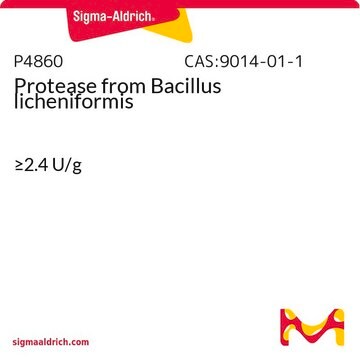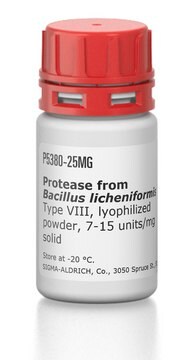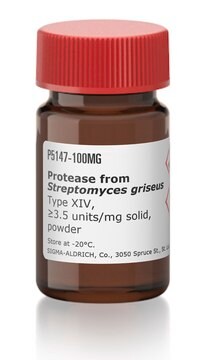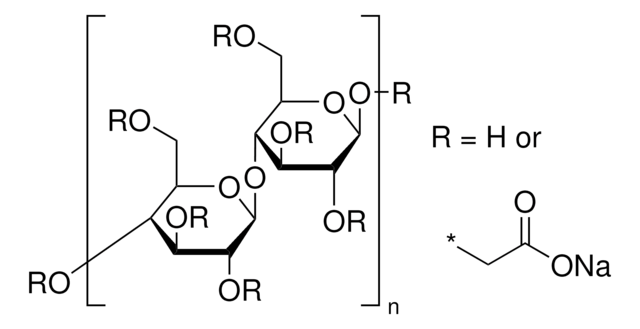Wszystkie zdjęcia(1)
Key Documents
P6236
Pyroglutamate Aminopeptidase from Pyrococcus furiosus
recombinant, expressed in E. coli, ~90% (SDS-PAGE), ≥5.0 units/mg protein
Synonim(y):
L-Pyrrolidone carboxyl peptidase
Zaloguj sięWyświetlanie cen organizacyjnych i kontraktowych
About This Item
Numer WE:
Numer MDL:
Kod UNSPSC:
12352204
NACRES:
NA.54
Polecane produkty
Opis ogólny
Pyroglutamate Aminopeptidase from Pyrococcus furiosus, also called the deblocking aminopeptidase, is a 42 kDa protein and belongs to aminopeptidase A family. It shares sequence homology with aminopeptidase in the active site, with conserved zinc and cobalt binding residues.
Zastosowanie
Pyroglutamate Aminopeptidase, from Pyrococcus furiosus is a recombinant, thermostable aminopeptidase that is expressed in Escherichia coli. It is used to cleave pyroglutamic acid which allows analysis of N-terminal sequences of peptides.
The enzyme from Sigma has been used for the removal of pyroglutamate (pGlu) N-terminal blocking group, under reduced conditions, prior to N-terminal sequencing of purified cassiicolin.
Thermostable aminopeptidase that liberates N-terminal pyroglutamic acid from proteins and peptides prior to Edman degradation.
Działania biochem./fizjol.
Pyroglutamate Aminopeptidase (PGP 1) interacts with immunoglobulin, functions as inflammatory cytokine and modulates immune response. The levels PGP 1 is elevated during inflammation.
This enzyme is specific for N-terminal pyroglutamic acids. It cleaves the N-terminal pyroglutamic acid from proteins and peptides prior to Edman degradation. The optimal temperature range is 95 to 100 °C and the optimal pH range is 6.0 to 9.0.
Definicja jednostki
One unit will hydrolyze 1 μmol of pyroglutamate p-nitroanilide per minute at pH 7.0 at 37 °C.
Postać fizyczna
Lyophilized powder containing sodium phosphate
Uwaga dotycząca przygotowania
Reconstitute the vial of enzyme with 50 μl of 50 mM sodium phosphate, pH 7.0, with 10 mM DTT and 1 mM EDTA. The reconstituted solution should be stored at -20 °C.
This page may contain text that has been machine translated.
Hasło ostrzegawcze
Danger
Zwroty wskazujące rodzaj zagrożenia
Zwroty wskazujące środki ostrożności
Klasyfikacja zagrożeń
Eye Irrit. 2 - Resp. Sens. 1 - Skin Irrit. 2 - STOT SE 3
Organy docelowe
Respiratory system
Kod klasy składowania
11 - Combustible Solids
Klasa zagrożenia wodnego (WGK)
WGK 3
Temperatura zapłonu (°F)
Not applicable
Temperatura zapłonu (°C)
Not applicable
Środki ochrony indywidualnej
Eyeshields, Gloves, type N95 (US)
Certyfikaty analizy (CoA)
Poszukaj Certyfikaty analizy (CoA), wpisując numer partii/serii produktów. Numery serii i partii można znaleźć na etykiecie produktu po słowach „seria” lub „partia”.
Masz już ten produkt?
Dokumenty związane z niedawno zakupionymi produktami zostały zamieszczone w Bibliotece dokumentów.
Klienci oglądali również te produkty
Frédéric de Lamotte et al.
Journal of chromatography. B, Analytical technologies in the biomedical and life sciences, 849(1-2), 357-362 (2006-11-23)
Cassiicolin, a phytotoxin produced by the necrotrophic fungus Corynespora cassiicola, was purified to homogeneity from a rubber tree isolate. The optimized protocol involves reverse phase chromatography followed by size exclusion chromatography, with monitoring of the toxicity on detached rubber tree
Pyroglutamate aminopeptidase 1 may be an indicator of cellular inflammatory response as revealed using a sensitive long-wavelength fluorescent probe
Gong Q, et al.
Chemical Science, 7(7), 4694-4697 (2016)
A Ultrasensitive Near-Infrared Fluorescent Probe Reveals Pyroglutamate Aminopeptidase 1 Can Be a New Inflammatory Cytokine
Gong Q, et al.
Advanced science (Weinheim, Baden-Wurttemberg, Germany), 5(4), 1700664-1700664 (2018)
New deblocking aminopeptidases from Pyrococcus horikoshii
Mori K and Ishikawa K
Bioscience, Biotechnology, and Biochemistry, 69(10), 1854-1860 (2005)
Marie Schaeffer et al.
Molecular and biochemical parasitology, 150(2), 318-329 (2006-10-10)
Pyroglutamyl peptidases I (PPI) are cysteine peptidases of the clan CF, family C15, which hydrolyse N-terminal l-pyroglutamyl residues (l-pGlu). The l-pGlu modification is a post-transcriptional modification that confers relative aminopeptidase resistance and, in some cases, is essential to the modified
Nasz zespół naukowców ma doświadczenie we wszystkich obszarach badań, w tym w naukach przyrodniczych, materiałoznawstwie, syntezie chemicznej, chromatografii, analityce i wielu innych dziedzinach.
Skontaktuj się z zespołem ds. pomocy technicznej












